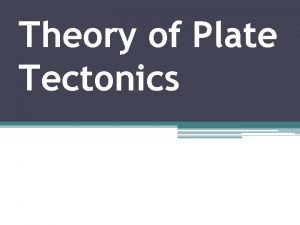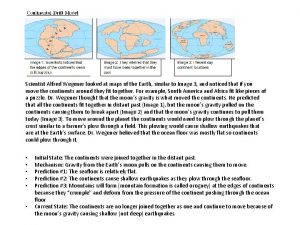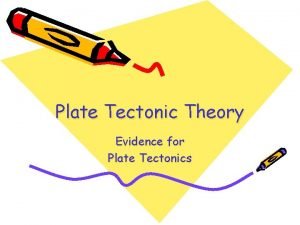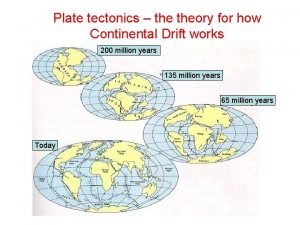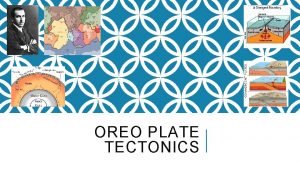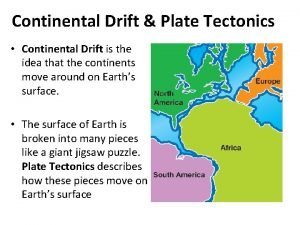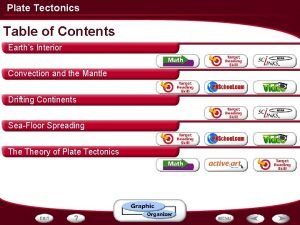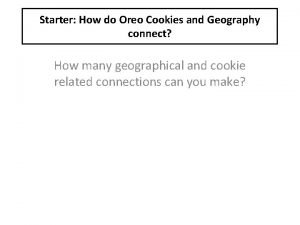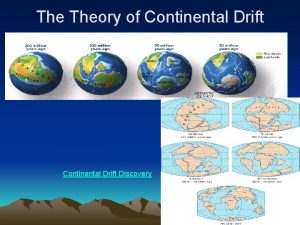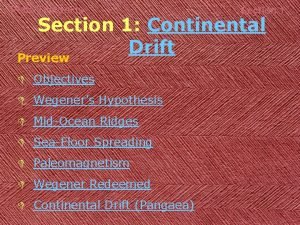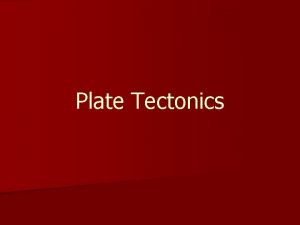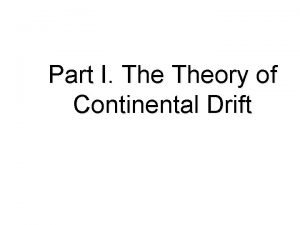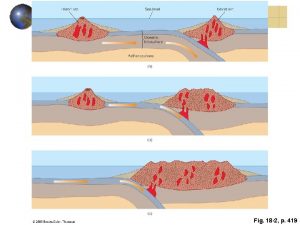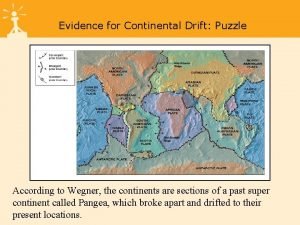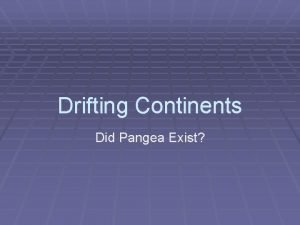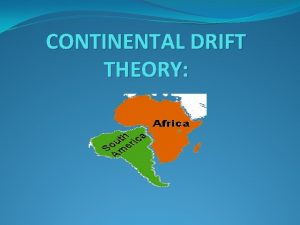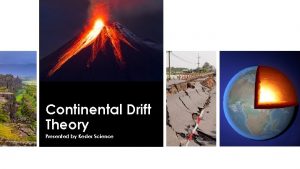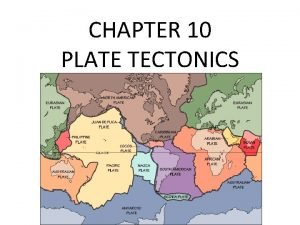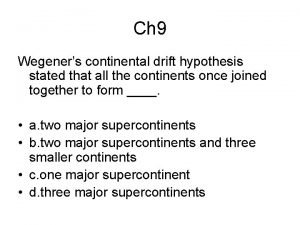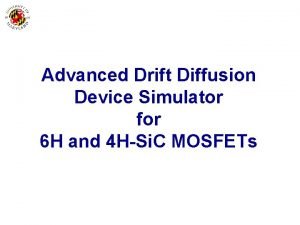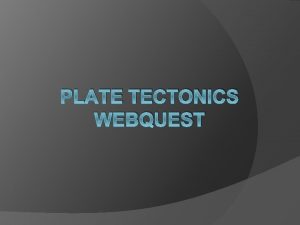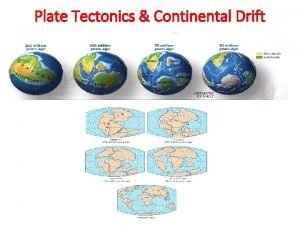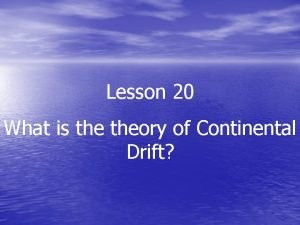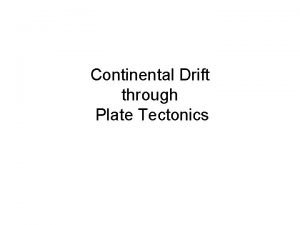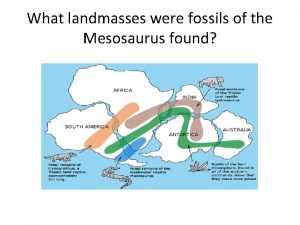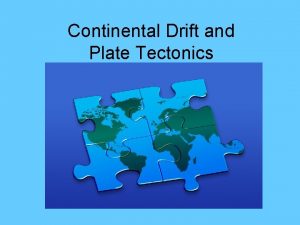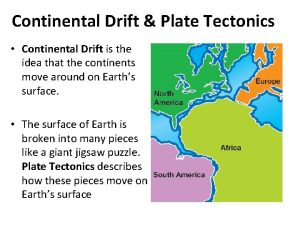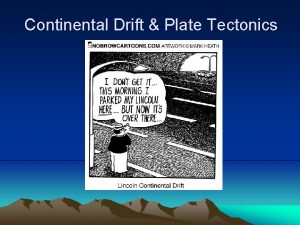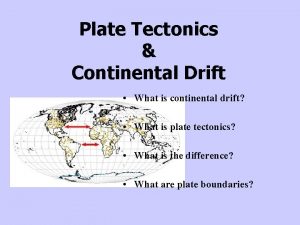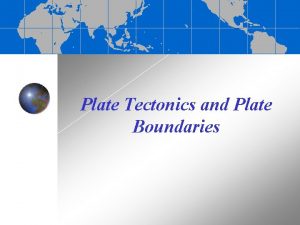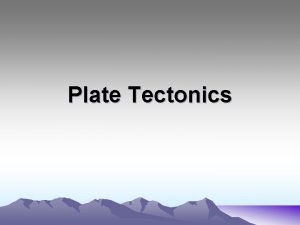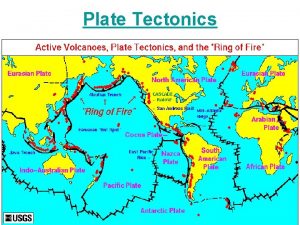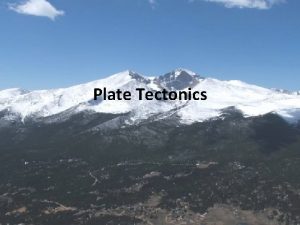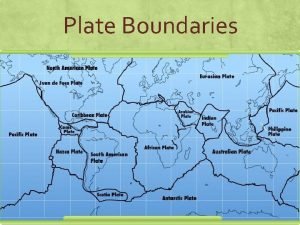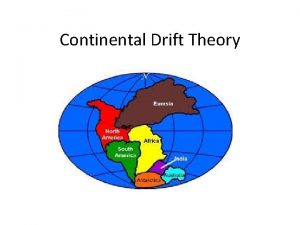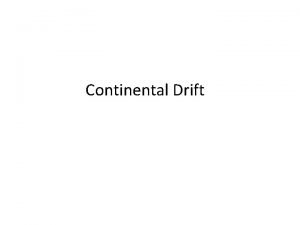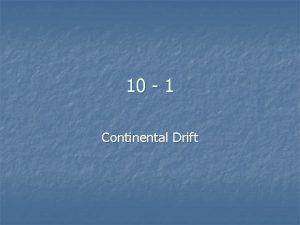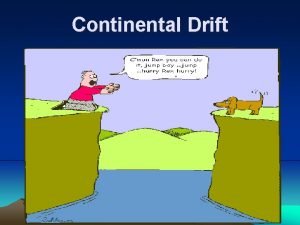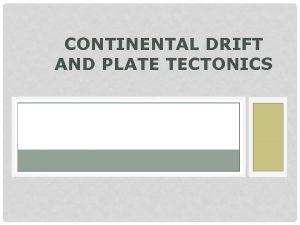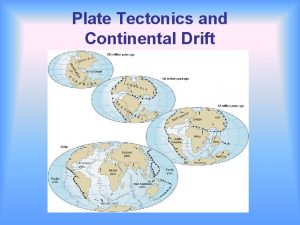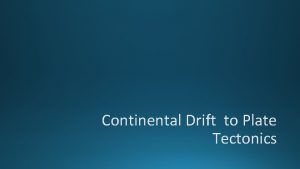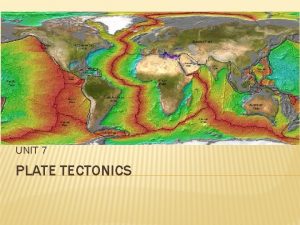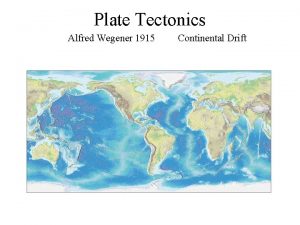Continental Drift and Plate Tectonics The Origins Alfred




























- Slides: 28

Continental Drift and Plate Tectonics

The Origins ¢Alfred Wegener developed a theory that the continents once formed a giant supercontinent


Evidence of Continental Drift ¢ Jigsaw puzzle like

Evidence ¢ Plant and animal fossils found on several different continents were quite similar. ¢ Physically impossible for these organisms to have traveled across the ocean ¢ Compelling evidence that the two continents were once joined.


Evidence ¢ Broad belts of rocks in Africa and South America are the same type ¢ Mountain belts match up

Evidence ¢ Glacial striations on rocks - cuts from when glaciers move match up across the world

So the Continents Move? ¢ Theory lead to Plate Tectonics l Plate Tectonics now is able to explain why, how, and where the plates will move. l Continental Drift only knew that plates moved, but DID NOT KNOW HOW



Projected Future

¢Crust- hard solid ¢Mantle- soft solid ¢Outer Core- liquid ¢Inner Core- solid


Earth’s Structure ¢ Lithosphere – crust and upper mantle l. Crust is broken up into large segments called plates

¢Asthenosphere – lower mantle

Plates and Layers Plates are made out of the Continental Plate Lithosphere Oceanic Plate ¢ “Float” on Asthenosphere ¢ Acts like a liquid and a solid ¢ Lithosphere Asthenosphere Mantle

Inside the Mantle ¢ ¢ Because the earth is very hot inside, a current of heat flows from the core to the crust. This is called convection current (heat rises, cools, then sinks down)

Convection Currents Explains how plates move ¢ Wegner could never explain this!! ¢

Plate Movements Plates are sitting onto of the mantle and “float”. ¢ They either push together, pull apart, or grind against each other. ¢

Divergent Plate Two plates push apart ¢ Creates sea floor spreading, leading to the formation of new crust ¢ SEA FLOOR SPREADING: ¢ l Mid Atlantic Ridge – magma coming up creating new rock in center

Forming a Divergent Boundary

Where is the youngest rock? Where is the oldest rock? Is there is a pattern?

What Do the Volcanoes Show? 40 myo 30 myo km 75 km 50 km 25 km 50 75 km 20 myo

Convergent Boundary ¢ ¢ Plates colliding together Ocean-Ocean : Volcanoes Ocean – Continental : Volcanoes Continental – Continental: Mountains

Convergent Boundary

Convergent Boundary

Transform Boundary Plates slide past each other ¢ Creates large breaks in rock ¢ Earthquakes ¢ Examples: San Andreas Fault ¢
 Plate tectonic theory vs continental drift
Plate tectonic theory vs continental drift Compare continental drift and plate tectonics
Compare continental drift and plate tectonics Continental drift theory and plate tectonics theory
Continental drift theory and plate tectonics theory Plate tectonics vs continental drift
Plate tectonics vs continental drift Continental drift
Continental drift Oreo tectonic plates
Oreo tectonic plates 7 lithospheric plates
7 lithospheric plates Harry hess and seafloor spreading
Harry hess and seafloor spreading Plate tectonics
Plate tectonics Edible plate boundaries
Edible plate boundaries Oreo tectonic plates
Oreo tectonic plates Continental drft
Continental drft First related the symmetrical magnetic patterns
First related the symmetrical magnetic patterns Evidence of continental drift
Evidence of continental drift Fossil correlation continental drift
Fossil correlation continental drift Fossils as evidence of continental drift
Fossils as evidence of continental drift Continental drift puzzle
Continental drift puzzle Continental drift theory notes
Continental drift theory notes Continental drift
Continental drift Kesler science plate tectonics
Kesler science plate tectonics Fossils as evidence of continental drift
Fossils as evidence of continental drift What type of
What type of Continental drift simulator
Continental drift simulator Continental drift
Continental drift Plate tectonics webquest answers
Plate tectonics webquest answers Continental drift
Continental drift Wegners theory of continental drift
Wegners theory of continental drift Continental drift warm up
Continental drift warm up Mosasaurus continental drift
Mosasaurus continental drift
